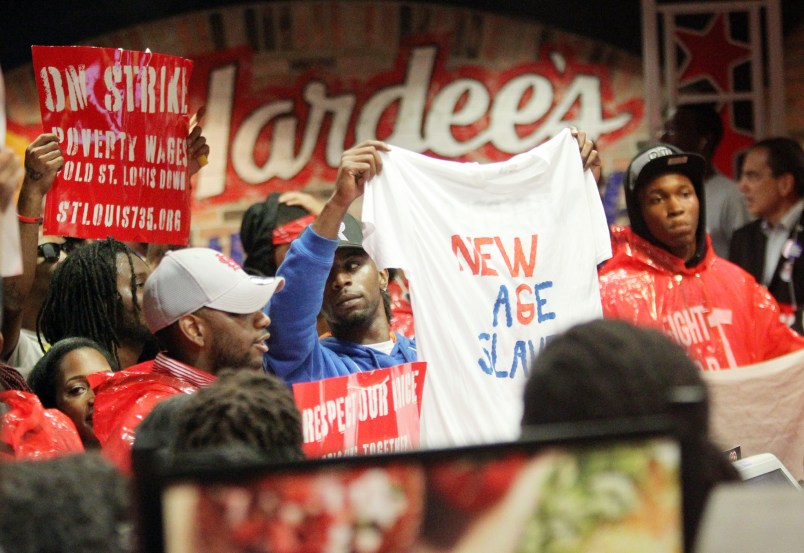One of the big political stories of this week is a new CBO report on the possible effects of a minimum wage increase.
The CBO’s study — the latest in a long line of conflicting analyses of the minimum wage — suggests that a minimum wage increase to $10.10 an hour would reduce poverty, but could also cost jobs.
A number of commentators, including Mike Konczal and Dean Baker, have responded that the CBO’s study overstates the costs and understates the benefits of a minimum-wage hike. Jared Bernstein says that a minimum wage hike would be “a significant net plus” that can help lift up wages generally.
At the bottom, the biggest problem in our economy is consumer demand. Growth can’t really take off unless more people have more money in their pockets to spend — and the extra money that comes from hiking the minimum wage goes right back into the economy as working-class people have more to spend.
Still, the headlines coming out of the CBO report throw a wrench into the momentum for a federal minimum wage increase.
But even if there were no CBO study, conservative politicians in Congress would oppose minimum wage increases as unnecessary governmental interference in the market.
Which raises a pretty important question: how, exactly, are we supposed to get wage levels up?
People who shrug and say “work harder” or “get a new job” are, at best, exercising some wishful thinking. The wage crisis isn’t a matter of individual moral failings; it’s systemic. Even as workers’ productivity remains strong, wages are making up a smaller share of the economy and business profits a higher share.
One of the most effective ways employees have traditionally managed to get a bigger share of the value they create is through the collective bargaining process — organizing together and leveraging their collective power into a demand for better wages. But that avenue, too, is under attack, heavily disfavored by Republican politicians.
In Tennessee, a union-organizing effort at a VW plant fell short last week. It happened for a variety of reasons, but at least part of the story was the active opposition of Republican politicians, who threatened economic consequences if employees voted for a union, and did everything they could to push a “no” vote. The loss prompted a downright giddy reaction among conservative politicians and pundits.
This active opposition to employee organizing isn’t limited to Chattanooga. Across the country — especially in midwestern states like Missouri, Indiana, Michigan and Wisconsin — Republican legislators are trying, with varying levels of success, to attack unions and collective bargaining. And if you want to see how employee efforts to raise their own wages fare with conservatives, check out how derisively Fox News covered last year’s fast food protests.
One way to get us closer to full employment, and increase the wages employees can command, is for governments to do more hiring directly. Unfortunately, for the past few years, we’ve seen exactly the opposite. Across-the-board budget cuts commonly known as sequestration and other austerity measures have cost thousands upon thousands of jobs, and constant showdowns over government funding have added more drag.
The fairly modest package of provisions called the American Jobs Act was one such effort to use government to jumpstart employment. Through tax incentives, infrastructure spending and investment in schools and public-safety employees, it would have added around 2 million jobs. It came up in the Senate in the fall of 2011, and consistently died there at the hands of a Republican filibuster. So much for that approach.
And even though wages are sputtering and unemployment remains high, Republican politicians in DC are ripping big holes in the social safety net that unemployed and working-poor people alike rely on. Low-wage jobs are largely subsidized by programs like food stamps and Medicaid, which protect workers’ basic needs even if their paycheck can’t cover it. But food stamps have been cut, Republican governors are refusing to expand Medicaid and politicians like Paul Ryan are complaining that safety-net programs deter people from working.
Without wage growth, middle-class and working-class people end up funding their lives through personal debt. A new report shows, unsurprisingly, that household debt is rising. As we saw in the 2008 housing crisis, this is a dangerous way to try and fuel an economy.
So: wages aren’t keeping working people afloat, and the economy is suffering. But Republicans have ruled out minimum wages, collective bargaining, direct federal hiring and social programs as ways to help working-class people support themselves and get ahead.
What’s left is little more than a contemptuous shrug. One could be forgiven for thinking that, under their purported concern about poverty and the dignity of work, their answer to the wage crisis is “who cares?”
Seth D. Michaels is a freelance writer in Washington, D.C. He’s on Twitter as@sethdmichaels.






